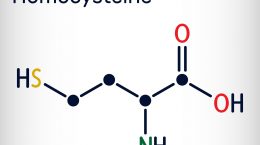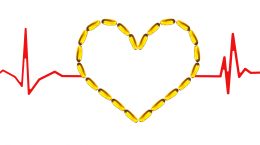Published on December 31, 2021
Video Friday: Studies suggest getting enough B vitamins can help prevent brain atrophy, dementia, and Alzheimer’s Disease, especially among those with high homocysteine levels
Key Points
- Certain nutrients can have a protective role on brain health and cognition, and can help decrease brain atrophy, the risk of Alzheimer’s Disease (AD), and other forms of dementia
- A high homocysteine level can cause brain damage, and is a strong risk factor for the development of dementia and AD; lowering homocysteine with B vitamin supplementation may slow the rate of accelerated brain atrophy in people with mild cognitive impairment
- Vitamin D, omega-3 fatty acids, and magnesium are other nutrients essential to the brain and to cognitive health and well-being

Brain shrinkage is a normal part of aging, however, it is accelerated among those who suffer from dementia and Alzheimer’s Diseases. More than 6.2 million Americans are living with Alzheimer’s Disease, and that number is projected to surpass 13.8 million by the year 2060.
There is much research showing that certain nutrients can have a protective role on brain health and cognition, and can help decrease brain atrophy, the risk of Alzheimer’s Disease (AD), and other forms of dementia. The video featured today, presented by NutritionFacts.org, reviews several studies that have shown a connection between B vitamin intake, dementia, AD, brain atrophy, and homocysteine levels.
Home Blood Spot Testing for Homocysteine is Now Available
This test is currently offered through Food for the Brain (FFB), another charity and friend of GrassrootsHealth, for a price of $65 (or subscribe and save up to 6%; GrassrootsHealth discounts do not apply to this test). While GrassrootsHealth is considering adding the homocysteine test to our study, we wanted to offer you the opportunity to test through FFB first and give us your feedback.
Buy Your at-home Homocysteine Test from Food for the Brain Here
Watch the Video
After watching the video, be sure to make note of our added details below.
Summary: B Vitamins and the Brain
An estimated 1 in 5 of US adults will end up with cognitive impairment by the age of 71, with about 12% progressing to dementia
Homocysteine is an amino acid created from the breakdown of certain proteins
B vitamins (especially folate and vitamins B12 and B6) are necessary for the body to break down and utilize homocysteine
A high homocysteine level is often seen among individuals with B vitamin deficiencies, as well as people with kidney disease, low levels of thyroid hormones, psoriasis, and with certain medications (such as antiepileptic drugs and methotrexate)
A high homocysteine level can cause brain damage, and is a strong risk factor for the development of dementia and AD; 1 in 6 cases of AD may be due to elevated homocysteine
Studies showed that lowering homocysteine with B vitamin supplementation slowed the rate of accelerated brain atrophy in people with mild cognitive impairment; the beneficial effect of B vitamin supplementation was greatest among those with high homocysteine
Methionine, a protein found in meat, is converted into homocysteine; decreasing animal protein in the diet may help lower homocysteine levels
High plant based diets (naturally high in some B vitamins and fiber) supplemented with vitamin B12 may help lower homocysteine levels among some
Vegans are highly susceptible to vitamin B12 deficiency, as well as a deficiency of vitamin B2 (riboflavin), vitamin D, protein, omega-3 fatty acids, calcium, and the trace elements iron, iodine, zinc and selenium
Vitamin D, omega-3 fatty acids, and magnesium are other nutrients essential to the brain and to cognitive health and well-being
Home Blood Spot Testing for Homocysteine is Now Available
This test is currently offered through Food for the Brain (FFB), another charity and friend of GrassrootsHealth, for a price of $59.95 (or subscribe and save up to 6%; GrassrootsHealth discounts do not apply to this test). While GrassrootsHealth is considering adding the homocysteine test to our study, we wanted to offer you the opportunity to test through FFB first and give us your feedback.
Buy Your at-home Homocysteine Test from Food for the Brain Here
Are You Getting Enough Vitamin D, Magnesium, Omega-3s, and Other Brain Boosting Nutrients?
 Having and maintaining healthy vitamin D levels and other nutrient levels can help improve your health now and for your future. Choose which to measure, such as your vitamin D, omega-3s, and essential minerals including magnesium and zinc, by creating your custom home test kit today. Take steps to improve the status of each of these measurements to benefit your overall health. You can also track your own intakes, symptoms and results to see what works best for YOU.
Having and maintaining healthy vitamin D levels and other nutrient levels can help improve your health now and for your future. Choose which to measure, such as your vitamin D, omega-3s, and essential minerals including magnesium and zinc, by creating your custom home test kit today. Take steps to improve the status of each of these measurements to benefit your overall health. You can also track your own intakes, symptoms and results to see what works best for YOU.
Enroll and test your levels today, learn what steps to take to improve your status of vitamin D (see below) and other nutrients and blood markers, and take action! By enrolling in the GrassrootsHealth projects, you are not only contributing valuable information to everyone, you are also gaining knowledge about how you could improve your own health through measuring and tracking your nutrient status, and educating yourself on how to improve it.





